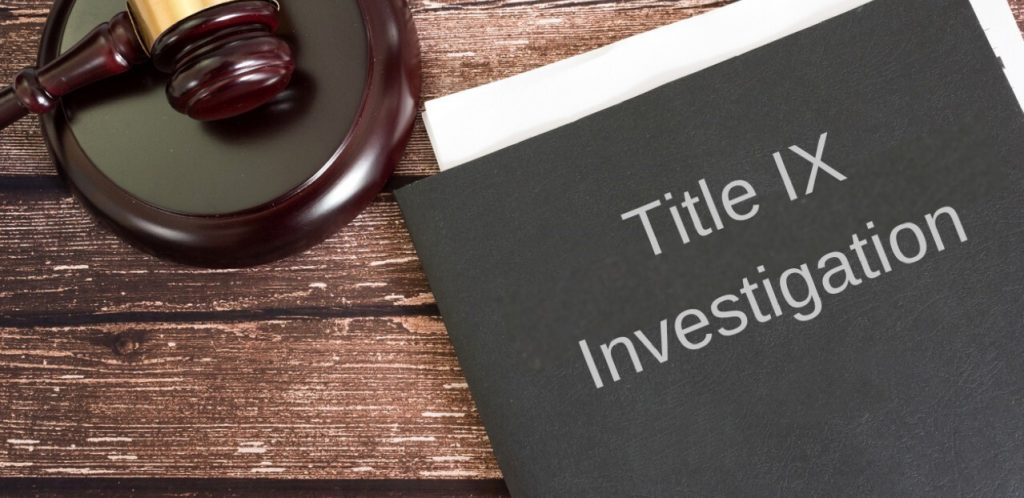In light of the ongoing Title IX Education Amendment of 1972, which was created to prohibit sex discrimination in education, it is important for educational institutions to know what is expected of them. In order to ensure compliance with this amendment, it was determined that a coordinator would be necessary on each campus. You can visit studentdisciplinedefense.com to understand more about Title IX and the role of a Title IX coordinator.
A Title IX coordinator must ensure that the school follows Title IX regulations and guidelines. This will include investigating any incidents or complaints filed with the university. They will also assist those who file a complaint about discrimination in education to ensure that their complaint is handled properly, and the school will follow federal regulations for handling complaints if it does occur.

Source: pandslawtitleix.com
The Title IX coordinator of an institution will also be responsible for ensuring that all documentation relating to Title IX is preserved and stored appropriately. This includes the investigation, any reports, and the overall outcome of an investigation. They will be able to keep these records for at least 20 years so that other students are aware of how the school does or does not handle reports of sex discrimination or harassment. It is required that these records be made available if there is a federal investigation.
The coordinator will also serve as a contact person for questions regarding Title IX. They will be able to provide information about the university’s policies and procedures regarding compliance with Title IX, as well as what gender discrimination is considered by the school. This individual will also be responsible for training faculty, staff, and students on how to handle or report situations where sex discrimination may occur. It is also the job of a Title IX coordinator to inform new students at their university about Title IX policies that they must follow while they are studying there.
Let us now see more into the responsibilities of a Title IX coordinator.
1. Handling Title IX complaints
As the Title IX coordinator, the primary responsibility of this person is to handle any complaints or incidents of possible sex discrimination on campus. This includes both sexual harassment and assault or rape. Even if the school announced that it is taking action about a situation, if a person believes that the school did not follow proper procedures in processing their complaint, then they can appeal to the Title IX coordinator.
2. Managing the campus disciplinary process
If a person does file a complaint about a school not following Title IX regulations, then the Title IX coordinator will also be responsible for managing the disciplinary process in accordance with federal law. This includes investigating any complaints made by students, faculty, or staff members and handling any such investigations while making sure that they follow all federal requirements.

Source: iwf.org
3. Overseeing the Title IX investigation on campus
This includes overseeing all Title IX reports made by students, faculty, and staff members. The Title IX coordinator will be responsible for helping any applicant file a complaint about their school or university not following procedures. They also oversee any investigation made on Title IX violations.
4. Educating the campus on Title IX policies and resources
This person is also responsible for educating the campus about the policies regarding Title IX and any resources it has provided to students, faculty, and staff members. They provide information to ensure that everyone is aware of Title IX policies and resources.
How Can Title IX Coordinators Help Students?

Source: wise-geek.com
As mentioned above, the Title IX coordinator oversees the policies and procedures of a school’s actions against gender discrimination. The coordinator is also responsible for ensuring that all policies are followed and that all feedback is taken seriously. Their job involves making sure that women, as well as men, have equal access to education on campus. They will also be responsible for making sure that any applicant has received fair treatment regarding their complaint about possible sex discrimination on campus.
The role of the Title IX coordinator does extend beyond just overseeing what happens on campus when it comes to gender discrimination. For example, they are in charge of informing new students about what is expected of them and what rights they have as students. They will also be responsible for educating new staff members about their responsibilities on campus and how to proceed when faced with discrimination or bias.
Another skill a person who works under the title of Title IX coordinator should have is the ability to work well with other university employees. They should form relationships with everyone within their school so that everyone is aware of how the Title IX coordinator is handling all complaints filed on campus. This will help to ensure that the campus is well aware of Title IX policies and their own responsibilities in following these policies.

Source: cityconnectsblog.org
To ensure that a school follows Title IX regulations and guidelines, a Title IX coordinator must provide sexual harassment training to all staff members, as well as students on campus. It is also important that any student knows exactly what should be done if they file a complaint about sexual harassment or notice any sexual misconduct being committed by another student.
Schools that fail to follow Title IX regulations could face monetary fines and potentially lose funds. Therefore, it is the responsibility of Title IX coordinators to ensure that all staff members, as well as students, are aware of their own responsibilities.
Conclusion
Title IX coordinators are a vital part of ensuring that both men and women receive equal treatment in their education. They are on the front lines when it comes to compliance with Title IX. This person is responsible for ensuring that policies are followed and all records pertaining to any sexual harassment or discrimination cases on campus are preserved and stored appropriately. They also provide students with information about Title IX and the resources they have available to them so that students know how best to handle situations.





















